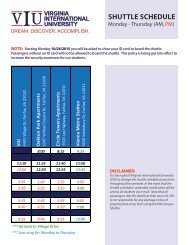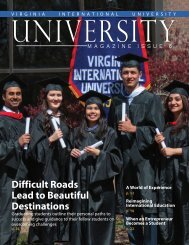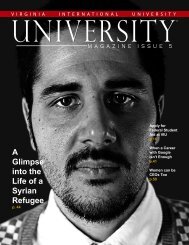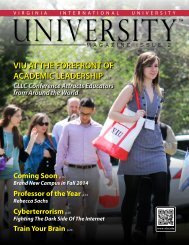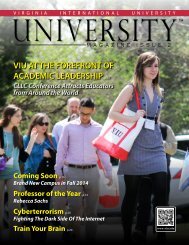VIU_Magazine_Summer_2017
VIU_Magazine Summer 2017
VIU_Magazine Summer 2017
Create successful ePaper yourself
Turn your PDF publications into a flip-book with our unique Google optimized e-Paper software.
<strong>VIU</strong>.EDU<br />
The Right Path<br />
Finding the right path in life isn’t the<br />
easiest thing to do. I didn’t choose<br />
journalism, journalism chose me. I<br />
was born in Hungary as a 7th generation<br />
Croatian which makes me half Croatian<br />
and half Hungarian but I am fluent in<br />
both Hungarian and Croatian. I had<br />
been thinking about attending university,<br />
when I realized that getting hands-on<br />
experience would excel my career path<br />
more than my degree. During the Serb<br />
and Croatian conflict in 1991, I knocked<br />
on the door of the Hungarian National<br />
television channel; I told them that I<br />
am not a professional but I speak fluent<br />
Serbian, Croatian, and Hungarian so I<br />
can be your translator. It was a win-win<br />
situation for everyone and I started taking<br />
notes, observing how journalists work.<br />
At that time, I was traveling 3 hours each<br />
way every day to the conflict areas, which<br />
was very boring.<br />
“I received the highest prize for journalism,<br />
which is called the Joseph Pulitzer Memorial<br />
award, even though I wasn’t a journalist.”<br />
A friend was living in the city of Osijek,<br />
so I decided to stay there. The Hungarian<br />
news representatives and I were supposed<br />
to meet every day at 9 am, but one day the<br />
region was blockaded by the Yugoslavian<br />
National Army. There was ongoing<br />
fighting with troops and I was trapped<br />
in the city. I was the only foreigner there.<br />
I called the Hungarian National TV to<br />
get me out. However, they couldn’t help<br />
me because of the blockade. I was the<br />
only one who could tell the media about<br />
the current situation from within the<br />
blockade.<br />
It was a fall of 1991, the phone lines were<br />
still working and my mother called me.<br />
She told me that she heard my voice on<br />
the national news channel as the exclusive<br />
correspondent for the Hungarian<br />
National TV. She was screaming at me<br />
to get out and come home. I told her if I<br />
could I would! I wanted to get home.<br />
I spent 89 days trapped in the region.<br />
Four days after I left the city, the BBC and<br />
the American news asked me to report<br />
on the situation and I told them that<br />
I didn’t speak English. I never had the<br />
opportunity to learn English in school.<br />
They [International News outlets] told me<br />
that my English vocabulary of about 50<br />
words was excellent. I remember my first<br />
report was short: “all bloody floors- big<br />
war big war- very dangerous- everything.”<br />
I realized that I am the best but the worst.<br />
I was the only one. During the conflict,<br />
no one wanted to ask Serb or Croatian<br />
journalists to go. I am a Hungarian<br />
citizen and everyone within the city knew<br />
that. So I spent 89 days in the region,<br />
and after I was brought to the refugee<br />
camp I was given to the Hungarian<br />
authorities. I received the highest prize<br />
for journalism in my country, which is<br />
the Joseph Pulitzer Memorial Award (the<br />
Hungarian Pulitzer), even though I wasn’t<br />
a journalist. I was also given a scholarship<br />
to attend a university; that’s when I<br />
started to learn what I was supposed to<br />
do before. Being there changed my life.<br />
Journalism has changed my life in many<br />
ways, but that was the first time.<br />
My personal and professional objectives<br />
changed 17 years ago. My faculty teacher<br />
once mentioned to me “If you would<br />
be a journalist- everything is allowed,<br />
but never lie.” I have been lying for last<br />
17 years of my life. My life completely<br />
changed on Friday, August 11th. Sorry, I<br />
have to back up a bit. My home country,<br />
Hungary, we are a nation of 10 million<br />
of people. During WWII we lost 600,000<br />
people; they died and disappeared in<br />
the Soviet Union and at Auschwitz. It<br />
was a common fact that after V-day<br />
soldiers, POW’s came back to Hungary<br />
from labor camps in Gulag in 1946-1948<br />
and one person returned in 1968. That<br />
means for years after the end of WWII,<br />
we received information that there is,<br />
perhaps, a POW in a mental hospital in<br />
Tatarstan, Russia. I knew if I said that<br />
I am a journalist, they would not allow<br />
me to take a video that would embarrass<br />
them- the fact that no one ever asked this<br />
gentleman where he is from; just said<br />
he was a mentally ill person. So I tried<br />
to figure out who was traveling to this<br />
region. Which ended up being no one but<br />
bear hunters. We filled out documents<br />
for myself and my cameramen to be bear<br />
hunters in the spring of 2000; we went<br />
to the city of Kotelnich which is on the<br />
border of Tatarstan, part of the former<br />
Soviet Union and we paid $800 to go into<br />
the area to report to meet this old person.<br />
We found him and figured out he was a<br />
Hungarian because he spoke Hungarian<br />
fluently. He never told anyone his name. I<br />
was involved in his rehabilitation process<br />
because 55 years after he left Hungary, I<br />
was the first person who talked to him<br />
<strong>Summer</strong> <strong>2017</strong> University <strong>Magazine</strong>, <strong>VIU</strong><br />
17




